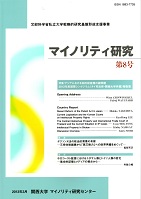Message from editor of the “Formation of Nation-State and Minority” Team ( Professor Masataka Yasutake)
The history of a nation-state formation stereotype is that minorities were to be put out of the way, unified and homogenized. However, minorities are not always being the matter to be restrained and homogenized by the nation-state. In a number of cases the minorities, expecting preservation of their significance, had been positively expressing loyalty to the nation-state, or participating in formation or administration of the nation-state. In addition, the nation-state, hoping to utilize resources under possession of minorities so as to unify a nation-state, was also compromised at a certain rate. Furthermore, in a number of cases, powerful minorities may control the large number of majorities and be leaders of the colonial administration. Taking these matters into consideration, this research team relates the hitherto understanding of nation-state and the minorities, in order to clarify the fundamental of the dynamic relationship between the two matters. And so as to understand their relationship, the research team focuses on logic of the nation-state, who chooses to eliminate or unify.
Unfortunately, most of the topics on nation-state have been discussed mainly on how to control the violence in nation-state, or how to achieve submission to the present nation-state. The descriptive sides; for instance, what is the meaning of a nation-state is in the first place, or how to utilize resources in a nation-state, were often been neglected. Therefore, this research group undertakes these problems to collaboration research under the following three pillars; a) rereading the European history of nation-state formation, b) modern movements of nation-state in European countries, c) actual condition of nation-state model adjustment in developing countries. Considering the interdependence of these three pillars is the originality of this research.



